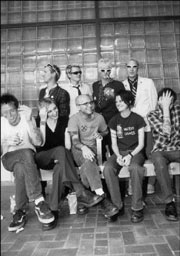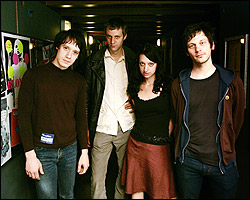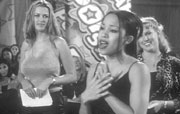THE BRIEFS AND CARISSA’S WIERD
EMP’s Sky Church, 8:45 p.m. (The Briefs), 10:15 p.m. (Carissa’s Wierd) Sat., Sept. 1
“This Could Be Anywhere” Dead Kennedys, Frankenchrist (Alternative Tentacles) 1985
In the Trophy room at the back of Shorty’s, Carissa’s Wierd are smoking cigarettes and slugging back bottled beer. The booth is high and wide; Jenn Ghetto, Mat Brooke, Sarah Standard, and Jeff Hellis (Ben Bridwell couldn’t make it) are safe from the filtered sunlight. It’s dark and comfortable and Mat has metaphors. One concerns breakfast food at McDonald’s and getting exactly what you want, one dead deer on the highway and levels of intelligence, and one concerns his bandmate Jenn and Smiths legend Morrissey. A curious head pokes around the corner, recognizes something—perhaps the tattoos—and smiles, going back to the business of locating the rest rooms. The band’s laughter is slow, quiet, and tempered by eyes that know more than they probably should; it matches perfectly the mood of their music.
Next door, Chris Brief, Lance Romance, Steve E. Nix, and Daniel J. Travanti are sitting outside the Lava Lounge when a group of guys in “I’m in a band” attire recognize the crew and stop dead in their tracks to tell the Briefs that they saw them in California and loved their show. The look is of Rock and Roll Awe. They were supposed to play a show in Seattle, but it doesn’t look like it’s going to happen. They ask if the Briefs are playing anytime soon and Lance tells them about a show that Friday. The visiting band is psyched; they’ll see the Briefs on their home turf and if the rest of their trip is a wash, at least they’ll get to see the spirit of the Johnny Thunders, Joey Ramone, and Stiv Bators resurrected and ripped into oblivion by what is currently this town’s best shot at punk perfection.
Yeah, this could be anywhere, but it’s here.
“Blank Generation” Richard Hell and the Voidoids, Blank Generation (Sire) 1977
Take any human population, extract out a sample of its citizens, analyze the banging noise in their heads and pirate what’s on their stereos or around their nighttime fires, and you will know who those people are. To the extent that Seattle is a cohesive organism built of thinking, dreaming, and believing individuals, the music that crawls out of our core characterizes our collective personality better than any Nasdaq rating, history book, or weather report ever could. In certain circles, we are as well known for Mudhoney as we are for Microsoft.
In Freudian terms, the Briefs are our id; our impulse center, our instinctual core. They are immediate satisfaction wrought with sludgy guitars and loud, instant anthems. Carissa’s Wierd are our ego, where self-preservation means suffering through love, accepting the black truths, and exposing the ache of honesty. Between the two, we manage to function. It’s no wonder then that we tend to watch over these bands as if they belong to us. Every night there’s a venue in town full of people who see themselves in the music that’s played there. And in the past year, we’ve seen the Briefs sign with the heavy-hitters at Interscope records while Carissa’s Wierd continues its symbiotic relationship with Brown. Both alternatives appeal to us; we can understand the desire to stay close to home, and we can relate to the decision to up the ante.
“Poor and Weird” The Briefs, Hit After Hit (Dirtnap) 2000
Last week’s edition of the Village Voice ran a feature equating the Briefs’ brand of chorus-heavy pummel punk with the legendary “Ramones-Pistols-Vibrators” era and christening our town the capital of “ooze.” Voice scribe Johnny Angel accurately describes the boys as the patron saints of the year 1977 and credits them with heralding the return of “one of the most crucial elements of snot-nosedness—that is, the overkill of absurd burlesqued aggression.” Angel’s observations are astute; the Briefs bring pure punk the way a migraine brings pain: without warning, without regard, and without a hint of apology.
The Briefs make no bones about their resistance to the reworking of punk rock. They play it old school. Period. The songs are fast and furious; the set is in-your-face and bold; their look, all ’80s shades and pegged legs, completes the aesthetic. And in broaching the topic of their recent migration to a major label, they have plenty to say about the integrity of bands before them that took a similar route. Voices escalate in enthusiasm as all four Briefs go through a laundry list of their favorite bands.
“The Clash, they were my first favorite band,” says Lance. Signed to British CBS Records in 1977 for a reported $200,000, the Clash were political, punk, and profitable.
“The Rolling Stones: One of my favorite bands,” says Steve. “Fucking major label. The Dickies, they’re on a major label—a couple of great albums. The Sex Pistols, whoever, I could care less what label they’re on. If they’re able to tour, I’d like them to come to my town. And that’s all we’re hoping to be able to do.”
On the subject of coming to our town, someone drops the name of one of their favorite bands, the Spitz, and for a few minutes, we’re safe from label debates and politics. But minutes later, they’re recounting a great story about Maximum Rock and Roll’s Mecca, Gilman Street. The Briefs had scheduled a tour around a show there, but when some of the staunchly political punk rockers found out they had signed with Interscope, they took the Briefs off the bill. So the boys quickly set up another show down the street in Oakland and let the people know they were playing there instead. The other bands on the Gilman Street bill supported the Briefs and told the crowd to go check out the show and even sold some of their CDs and T-shirts.
“It felt pretty punk,” says Steve, and his bandmates nod.
“You Should Be at Home Here” Carissa’s Wierd, You Should Be at Home Here (Brown) 2001
“You get your directions to the club and it’s either a basement or a comic book store. It’s always a surprise,” deadpans Carissa’s Wierd’s ringleader, Mat. “One time we played a gay disco bar in a shopping mall. We had to use the escalator to get our equipment up.”
Picturing the five deceptively frail figures inside a disco bar, much less one stuck inside a mall, is not an image one comes upon easily.
“They had the strobe lights going while we played,” offers Sarah.
It’s difficult to imagine because as hauntingly beautiful and painfully sublime as their music is, Carissa’s Wierd aren’t exactly a stereotypical live band.
“It surprises me that anyone would want to sit through an entire set,” says Mat. But plenty of folks do, and they seem to even live for it; they are the people who make no bones about telling the rest of the crowd to shut up and listen. At a Carissa’s Wierd show, often the only audible noise above the gentle din of strings and layered vocals is the sound of an insistent, finger-to-pursed-lip, “SSSSHH.” Carissa’s Wierd inspires a fierce loyalty. Just ask anyone who works the counter at our local record stores. Both Carissa’s Wierd records flew off the shelves and quickly veered into near extinction. As did Sadstyle (also on Brown), Jenn’s solo four-track project recorded at home under the name S.
“The label doesn’t even have distribution. It’s that small,” says Mat of Brown.
When the band first started attracting the attention of press and the populace, labels showed up at their shows and expressed an interest in signing them, but the band never quite got it together to follow through. So Ben decided to invent Brown and put the record out himself. Then he put out a couple more records and that’s when things got hectic.
“Any band that he signs, he wants them just to do one or two records then move on,” says Mat. And when I run into Ben a few days later, he concurs. It looks like Carissa’s Wierd won’t be staying on their small, grassroots label for too much longer.
“It’s been known from the get-go that we’re not going to stay on Brown forever,” says Mat. “We’re treating it like a stepping-stone. I think we’re going to move to something bigger in the next six months.”
Bigger and better aren’t necessarily things that appeal to everyone, and Carissa’s Wierd, like the Briefs, know that.
“I would think the songwriting would never change though; if it did I think we should just quit,” says Mat.
And, again, everyone around the table just nods.








